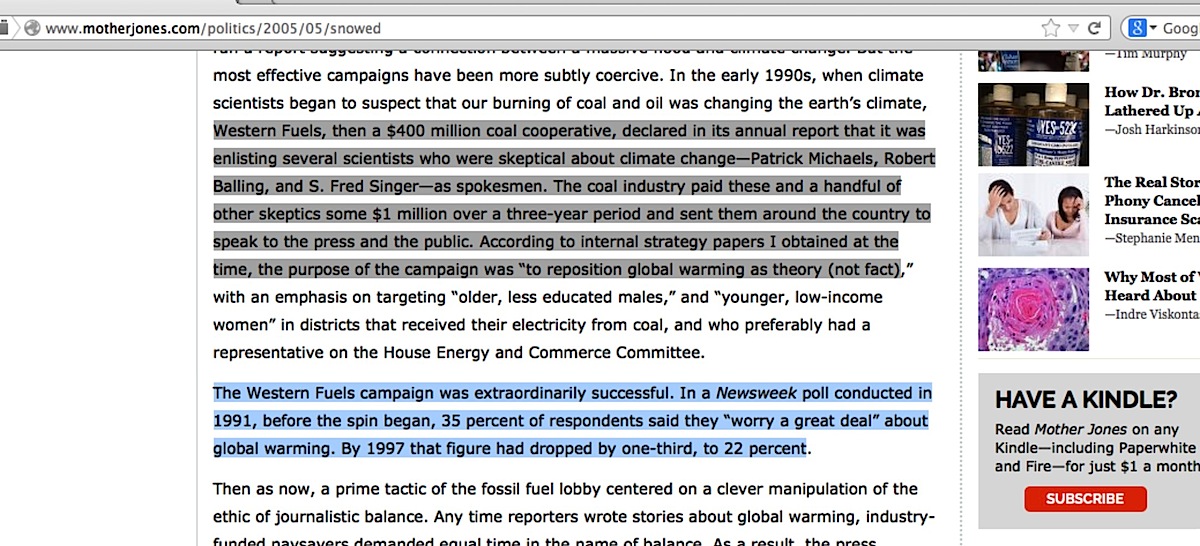In telling the tale of inadvertently discovering how skeptic climate scientists are corrupted, a person might be viewed as a hero or heroine, and it is understandably forgivable if the hero/heroine has a memory lapse about exactly when this event happened, or about minor narrative details surrounding it. But when the tale takes on an increasing appearance of being a fabrication designed to make the person look like a hero/heroine, unbiased objective thinkers will start to wonder why there would be any necessity for that kind of embellishment, and they might also wonder if there is something inherently wrong with the core of the tale. Continue reading
Category Archives: Embellishments
The Ongoing Embellishment Problem
My recent Twitter debate with John Stauber, co-author of the “Trust Us, We’re Experts” book, reminded me of a particularly embarrassing embellishment error that pops up elsewhere among efforts to portray experts on man-caused global warming as authoritarians above reproach. It’s like the proverbial fish story, the tendency to make things bigger than they actually are. Continue reading
‘Industry PR Campaign sways US Opinion’; except practically nobody saw it
Ross Gelbspan’s “Snowed” article in the May/June 2005 issue of Mother Jones magazine described how a ‘misguided application of journalistic balance’ and ‘a decade-long campaign of deception, disinformation, and, at times, intimidation by the fossil fuel lobby’ was causing the media not to properly warn us about the perils of global warming. Accept his narrative without question, and it’s a rallying cry to solve the problem. But notice the errors in his article’s 5th & 6th paragraphs, and it makes you wonder how much more he gets wrong.

When is a “Climate Change Expert” not an Expert? (a question Al Gore can use to salvage his legacy)
Embellishing credentials is an exceptionally bad idea, whether it’s done in self-promotion, or or done deliberately to hoodwink the public, or done mistakenly because someone didn’t do elemental fact-checking. Yet in the global warming issue, we see instances where a major organization promoted the chairman of the Intergovernmental Panel on Climate Change (IPCC) as a Nobel laureate when he is not, and another organization similarly promoting a prominent IPCC scientist as a Nobel laureate when he is not, and the long-term promotion of book author Ross Gelbspan as a Pulitzer winner when he is not, a problem first revealed long ago by Steve Milloy and expanded upon at this blog. But now, let’s examine Gelbspan’s other small problem, the “Climate Change Expert” label. Continue reading
When is a “Pulitzer Winner” not a Pulitzer Winner?
The March 26, 2006 ABC News quote I put in the main blog banner illustration above is a case study on how the news media repeats the basic accusation against skeptic climate scientists, and steers us to what is supposed to be devastating reporting by an unimpeachable source:
Pulitzer Prize-winning journalist Ross Gelbspan blames a 15-year misinformation campaign by the oil and coal industries. […] To redefine global warming as theory — not fact — the industry funded research by “friendly” scientists…”
Perish the thought of the news media actually giving skeptics a fair shot at defending their science assessments, such as the way the PBS NewsHour has demonstrably excluded them from its program for 17+ years. Otherwise viewers might perceive a significant flaw with the “misinformation” accusation. But since we are talking about journalists who must aspire to do reporting worthy of a Pulitzer Prize, we have to wonder how they let Gelbspan’s “Pulitzer winner” label go unquestioned. Surely, if an ex-editor/reporter gains fame as a Pulitzer winner, we have a giant problem if he never won a Pulitzer, don’t we? Continue reading
Ironclad Accusations Need No Embellishments. Correct?
My first blog piece on Gelbspan’s unexplained “Singer/Idso name switch” between the hardcover and paperback editions of his “The Heat is On” book told how his supposedly ironclad accusation had a significant problem from its inception. Now let’s see how Gelbspan’s accusation repetitions contain an odd embellishment. Continue reading
